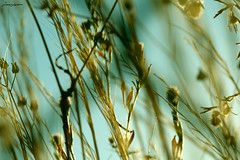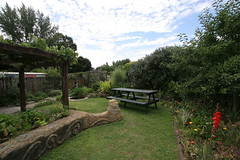Many people say they have no luck at all with such a garden. However, it is not a question of luck, but a question of understanding, for wild flowers are like people and each has its personality. What a plant has been accustomed to in nature it desires always. In fact, when removed from its own sort of living conditions, it sickens and dies. That is enough to tell us that we should copy Nature herself.
When you are hunting wild flowers, as you choose certain flowers from the woods, notice the soil they are in, the place, conditions, the surroundings, and the neighbours.
| Wildflowers. (Photo credit: Wikipedia) |
Wild flowers ought to be transplanted after blossoming is over. Take a trowel and a basket into the woods with you. As you take up a few, a columbine, or a hepatica, be sure to take with the roots some of the plant's own soil, which must be packed about it when replanted.
The bed into which these plants are to go should be prepared carefully before you obtain your plants. It is not a good idea to bring those plants back and let them sit over a day or night before planting. They should go into their new quarters at once. The bed needs soil from the woods, deep and rich and full of leaf mold. The drainage system should be excellent. Some people think that all wood plants should have a soil saturated with water. But the woods themselves are not water-logged. If you have heavy, wet soil, you may need to put in some extra work, and dig your garden up very deeply and put some stone in the bottom. Then replace the soil. And on top, where the top soil once was, put a new layer of the rich soil you brought from the woods.
Before planting, water the soil well. Then as you make places for the plants, put into each hole some of the soil which belongs to the plant which is to be put there.
Once your bed is prepared, you are ready to collect plants to fill it, and build your beautiful new wildflower garden!
Be sure to check back next week when we will share some ideas and suggestions for what flowers to plant, and how to choose the right ones for your wildflower garden.






